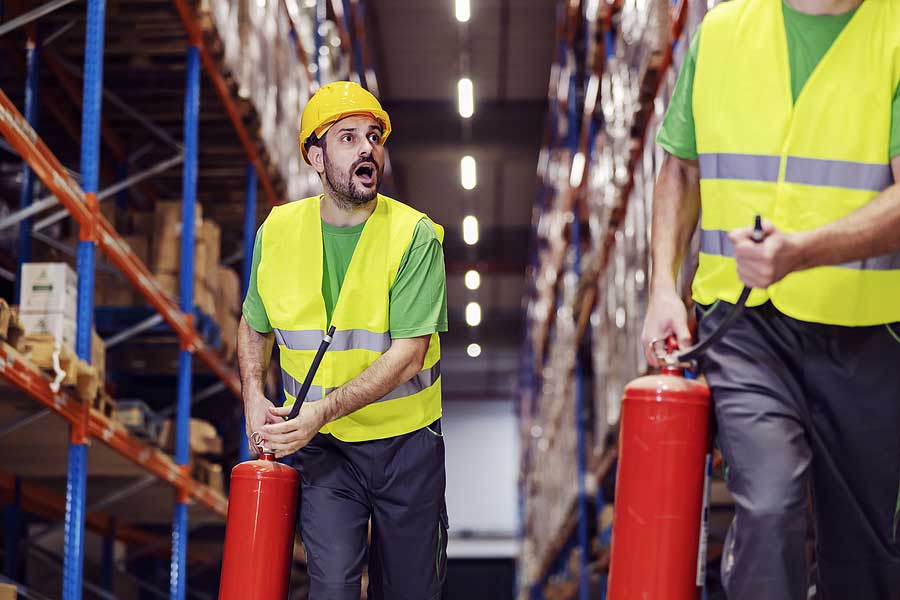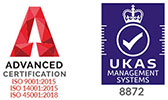Fire can be devastating to a business, no matter what you do. It can heavily damage property, stock and even cause injury or death to employees. The warehouse is an environment that poses more risk than other workplaces, arguably, when it comes to fire hazards and risk, mainly because they’re more likely to handle flammable liquids and materials, for example. So here are five fire hazards that could pose a threat to your warehouse and how to avoid them the best you can:
1. Smoking in the warehouse
Smoking indoors, as well as in a vehicle, was banned by the government in 2007 and added under the Health Act 2006. This was done to help protect non-smokers from passive smoking and the ban extended to the workplace. As such, commercial premises had to start adding outdoor smoking areas for their employees and is now commonplace for office buildings, hospitals and other places of work.
Although, according to the NISG, it’s not actually a legal requirement for employers to provide designated smoking areas, but if you do, there are some rules that need to be followed. This isn’t just for the safety of non-smokers, but it also helps to protect against workplace fires and that extends to those who work in warehouses. If you’re going to provide employees with a smoking area, it needs to be:
- Equipped with bins specifically designed to hold waste cigarette products
- Open and well-ventilated, making sure at least one side of the shelter is open to the elements
- Approved by the council in some cases by way of planning permission, so check with your local authority
- Compliant with modern and up to date building regulations
- Away from any domestic neighbours and windows that lead into the main dwelling
- Made from fire retardant materials
- Secured to the ground to ensure it doesn’t become damaged in high winds, for example
2. Electricals & lighting
Electrical fires have always been something of a worry, not only to commercial property owners, but to domestic ones as well. Lighting can also pose the same threat as, most often, that too is powered by electricity. According to AIE Fire Protection, fires started as a result of electrics and/or lighting issues were often derived from:
- Poor, faulty or damaged wiring
- Damaged cables
- Smashed filament lightbulbs
- Lamps that weren’t wired correctly or that were connected to old wiring
- Transformer faults
- Failing or lack of plug fuses
To help avoid an electrical fire or to stop a fire starting as a result of poor lighting, you should never leave anything plugged in for longer than is necessary and make sure all lights are turned off when not in use, unless it’s emergency lighting. Do not leave something plugged in unsupervised and double check that everything is turned off before you leave the premises for the night.
You should also refrain from using extension cords as a permanent feature in your warehouse. If you do use them, make sure they’re unplugged and packed away safely after every use and do not plug one extension cord into another. Make sure, also, that you aren’t overloading plug sockets and outlets.
3. Rubbish
It might not sound like much, but having copious amounts of rubbish lying around your premises is not only a trip and slip hazard, but it’s also a fire risk. Rubbish is generally combustible. If a fire was to break out in your warehouse, it would thrive on piles of rubbish that have been left lying around.
If there are several pockets of rubbish dotted around your premises, then you can expect a fire to rip quickly through your warehouse. Make sure that employees know where and how to dispose of the rubbish they have, whether it be leftover pieces of packaging or crisp packets that have derived from their lunch. Depending on the industry you work in, you might also be working with chemicals and other risky materials.
You need to make sure that there are designated, separated areas in which to place those waste products, especially if they’re flammable and/or combustible. If you notice that a rubbish bin is becoming full, ensure it’s emptied and removed from the site as soon as possible. In addition, make sure those who smoke are strictly prohibited from throwing cigarette ends into the general bin. They must go into designated receptacles in an external bin, as already touched upon.
4. Equipment used to heat the warehouse
Warehouses can be very cold places, especially in the winter, so it’s no wonder that the property owners are buying devices, such as electric heaters, to try and make conditions more comfortable for their workers. But these carry their own risks, as do other methods of heating a warehouse.
Fixed or portable space heaters, central heating, a congested chimney, a defective or blocked flue or even confined fuel burners or boilers can pose a fire risk to those in the workplace. In fact, portable space heaters are so notorious for starting warehouse fires that some insurers will not cover a premises if they use the aforementioned heating equipment.
If you’re finding that you’re struggling to keep your warehouse and distribution premises warm, then upgrade your heating system to one that’s suitable for a commercial property and is modern and in line with building regulations. Not only will you be helping to keep your employees safe, but it will also save you a lot of money in the long run if your central heating system is modern and efficient, where it wasn’t before.
5. Flammable & combustible liquids
Depending on the industry you work in, there could be instances where flammable or combustible materials and liquids are either used or stored on your premises. This is an incredibly important thing to consider when looking to ensure your warehouse has minimised the risk of a fire as much as possible.
Most of the time, warehouse owners have to worry about things like LPG and diesel; usd to fuel heavy machinery such as forklift trucks. These gases and liquids are able to ignite exceptionally quickly if exposed to open flames or even slight sparks. In order to prevent a fire from starting as a result of coming into contact with flammable and combustible liquids and materials, you should:
- Make sure all employees are trained in the handling, using and storing of those liquids and materials
- Giving those materials designated storage areas that are well away from other aspects of your warehouse
- Providing fire extinguishers and other pieces of equipment that can be used specifically to put out fires as a result of flammable liquids and combustible materials, not all fire extinguishers can be used for the same thing – according to Marsden Fire Safety, foam extinguishers should be used on flammable liquid fires, including petrol and diesel
Multy Lift has over thirty years of experience supplying customers throughout the UK with first-class, high-quality material handling equipment. From new and used forklifts to reach trucks and order pickers, you can rest assured that we’ll have the machinery you need to ensure your operations run as smoothly as possible, regardless of the industry you work in or where you’re based across the country. For more information about how we can help you today, get in touch with a member of our expert team – we’re always pleased to hear from you.






